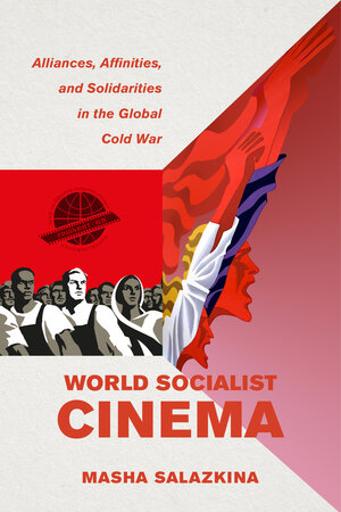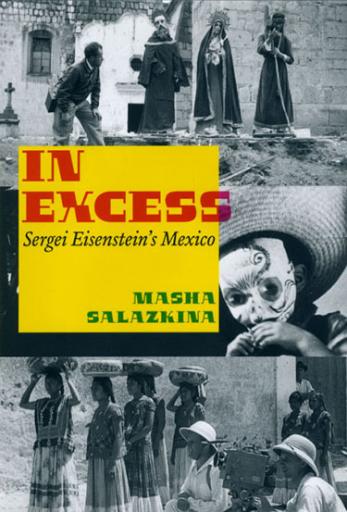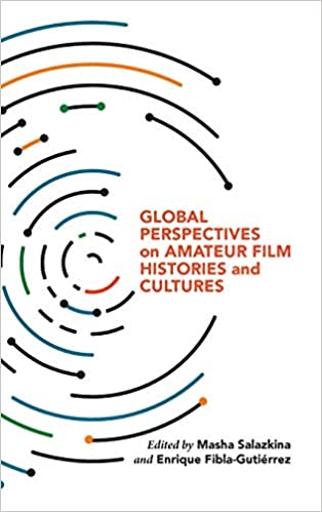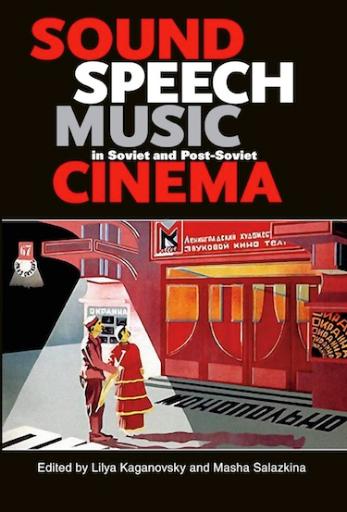Masha Salazkina, PhD
- Professor (Film Studies), Cinema
Are you the profile owner?
Sign in to editResearch areas: transnationalism, Marxist theory, cinema, civil society, Latin America, Soviet film, history of film theory/criticism, sound, "Third Cinemas", New Latin American Cinema, Thirdworldism, political cinema, cultural studies, history of film education, global socialist/postsocialist cultures, postcolonialism, film institutions, history of film festivals, translation in cinema
Contact information
Email:
Website:
Biography
Masha Salazkina's work incorporates transnational approaches to film theory and cultural history with a focus on the historical relationship between the Socialist bloc and countries of Asia, Africa and Latin America. She has published essays in Cinema Journal, Film History, October, Screen, Framework, Canadian Journal of Film Studies, and many edited collections on such topics as the geopolitics of film and media theory production; theorizations of World Cinema; history of film education; cinemas of solidarity and internationalism; non-professional cinema, and global circulation of popular culture.
Her first book, In Excess: Sergei Eisenstein's Mexico (University of Chicago Press, 2009), positions Eisenstein's unfinished Mexican project and theoretical writings within the wider context of post-revolutionary Mexico and global cultures of modernity.
World Socialist Cinema: Alliances, Affinities and Solidarities in the Global Cold War (U of California Press, 2023, Open Access) – named one of the best academic books of the year by The Chronicle of Higher Education – takes Tashkent Festival of Cinemas of Asia, Africa and Latin America as an aperture into the investigation of material networks and symbolic forms that were shared across (pro)socialist Cold War film cultures globally in the 1960s-1970s.
Romancing Yesenia: How a Mexican Melodrama Shaped Global Popular Culture (U of California Press, 2024, Open Access) focuses on the production, international distribution and reception of the highest grossing movie in the history of Soviet film exhibition, Mexican historical melodrama Yesenia (1971). The book offers a transnational and comparative analysis of 1970s cultural industries (from television and popular music to fashion) and informal practices of circulation (from bootlegs and song covers to DIY dressmaking) in both, Soviet Union and Mexico.
She also co-edited Sound, Speech, Music in Soviet and Post-Soviet Cinema (with Lilya Kaganovsky, 2015), Global Perspectives on Amateur Film Histories and Cultures (with Enrique Fibla Gutiérrez, 2022, both from Indiana University Press), Teaching Migration in Literature, Film, and Media (with Yumna Siddiqi, MLA, 2025). She contributes to an open-access archive of non-professional filmmaking around the world, where she co-edits translated works of criticism on amateurism.
Dr Salazkina is currently working on two edited volumes on histories and practices of global solidarity, a special issue of Feminist Media Histories on Developmentalism, Media, and Gender. Her ongoing research focuses on the histories of global circulation of popular culture - from Latin American telenovelas to Euro-Caribbean disco music - across the Iron Curtain in the 1970s-1990s. She is a member of The Black Sheep Society, an interdisciplinary association of scholars of REES working within the traditions of leftist analysis and critique, working group Global Cultures of Socialism, and Global Circulation of Film Theory network.
Education
PhD (Yale University)
Keywords
internationalism; film festivals; film education; postsocialism

World Socialist CInema
University of California Press

In Excess: Sergei Eisenstein's Mexico
University of Chicago Press, 2009

Global Perspectives on Amateur Film Histories and Cultures
Indiana University Press

Sound, Speech, Music in Soviet and Post-Soviet Cinema
Indiana University Press, 2014

Romancing Yesenia
Teaching activities
Graduate seminars:
FMST 802 Global and Transnational Methods in Film and Media Research (PhD)
FMST 804 Cinemas of Global Socialism
FMST807 Transnational Approaches to Media and Migration (PhD)
FMST807 Geopolitics of Film and Media Studies (PhD)
FMST600 Writing and Researching Cinema (MA)
FMST800 Film Education: Historical Approaches (PhD)
Undergraduate courses:
FMST412 Geographies of Cinema: Socialism and After
FMST211 Film History to 1959
FMST 315 Contemporary Film Theory
Publications
Select recent writings (full text available online):
"World Cinema as Method" (2020, Canadian Journal of Film Studies vol 29 issue 2)
https://www.academia.edu/44712852/WORLD_CINEMA_AS_METHOD
“Introduction: Global perspectives on amateur film cultures” (with Enrique Fibla), in Global Perspectives on Amateur Film Cultures, Indiana University Press, forthcoming 2020
- “Eisenstein in Latin America” in The Flying Carpet. Studies on Eisenstein and Russian Cinema, eds. Joan Neuberger and Antonio Somaini, Éditions Mimésis, 2018.
https://www.academia.edu/35308615/Eisenstein_in_Latin_America
- “Transnational Genealogies of Institutional Film Culture of Cuba, 1960s-70s” in The Routledge Companion to Latin American Cinema, eds. Marvin D’Lugo, Ana M. López and Laura Podalsky, Routledge, 2018
- “Translating the Academe: Conceptualizing the Transnational in Film and Media Studies” in The Multilingual Screen: New Reflections on Cinema and Linguistic Difference, eds. Lisa Patti and Tijana Mamula, Bloomsbury, 2016.
“(V)GIK and the History of Film Education in the Soviet Union, 1920s-1940s” in Companion to Russian Cinema, ed. Birgit Beumers, Wiley-Blackwell Press, 2016
- “Tashkent ’68: A Cinematic Contact Zone” (with Rossen Djagalov), Slavic Review Special Issue on Soviet Geopoetics, 2016
https://www.academia.edu/26039277/Tashkent_68_A_Cinematic_Contact_Zone
- “Dissonances in 1970s European and Latin American Political Film Discourse: The Aristarco-Garcia Espinosa Debate” (with Irene Rozsa) in Canadian Journal of Film Studies 24.2, 2015
- “Estates General of Third Cinema: Montreal’74” (with Mariano Mestman) in Canadian Journal of Film Studies 24.2, 2015
https://www.academia.edu/24519795/Introduction_Estates_General_of_Third_Cinema_Montreal_74
- “Geopolitics of Film and Media Theory in the Age of Neoliberal Globalization” in Framework 56-2, 2015
“Moscow, Rome, L’Havana: A Film Theory Roadmap” October 139, Winter 2012
https://www.academia.edu/6630668/Moscow_Rome_Havana_A_Film_Theory_Road_Map
- “Soviet-Indian Coproductions: Alibaba as Political Allegory. ”Cinema Journal 49. No 4, Summer 2010
https://www.academia.edu/6630666/Soviet_Indian_Coproductions_Alibaba_as_Political_Allegory


